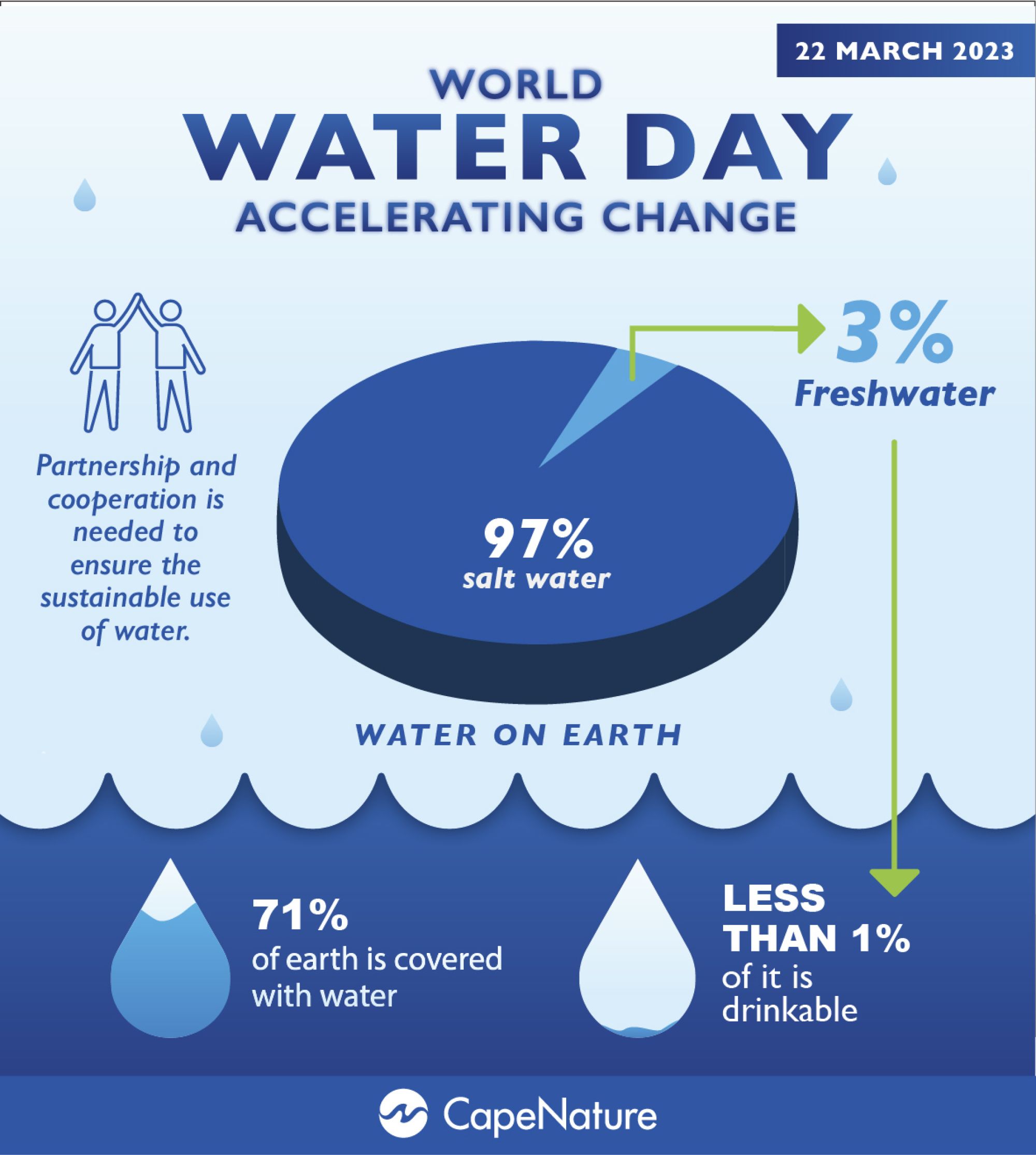
World Water Day – Make World Water Day, Every Day!
World Water Day is celebrated on 22 March each year. This year, the theme is “accelerating change”, which directly speaks to the changes required towards improving the world-wide water and sanitation crisis. World Water Day and the Department of Water Affairs and Sanitations’ “Water Week” into which it falls, shines a spotlight on the importance of the sustainable management of water, but this is a concept that should be applied every single day by everyone.
Those of us that live in the Western Cape had a very recent reminder about the importance of clean water during the drought. Moreover, there are still some areas in the rest of the country that are experiencing drought. We were able to adapt our water use practices significantly enough to diminish the imminent threat of “Day Zero” in the Cape Town Metro area. It is likely that at least some of us are still applying many of the water saving actions adopted during the recent drought.
In the Western Cape, naturally clean water comes from mountain catchments, many of which are conserved within CapeNature’s Managed Protected Areas. These water sources, include both surface water and groundwater ecosystems. To keep the water clean, these catchments must be conserved to continue to provide good quality water for various uses, including the special Western Cape biodiversity and our own livelihoods. Under the effects of global climate change, it is predicted that drought and flood events will increase in frequency and there is therefore a need for the protection of larger parts of these water source catchments and increased funding for invasive alien tree clearing projects in these catchments.
Once the water exits the catchments, the impacts related to the “sanitation” part of the water crisis enters the sustainable water management equation. It is here where most “accelerated change” is needed at both the urban and agricultural scales. Water quality of rivers and wetlands is known to deteriorate quickly once these systems reach the lowland areas, mainly due to our uses of this water. This includes the stormwater and wastewater management in the urban scope, and the application of more “water friendly” irrigation and application of pesticides and herbicides in the agricultural scope. The Conservation Agriculture concept comes to mind and wider implementation of these methods should be included in all farming practices. Especially when it comes to water used for irrigation of crops.
But these are all large-scale principles. Changes in water use practices, including water pollution management, should start to happen more sustainably at local scales. Zooming down even more, each of us should start working more water wise. Many examples of how to reduce our own personal water use exists (e.g. see the Action List here). But we should also make an effort to understand the importance of naturally functioning freshwater ecosystems from the catchment to the coast. And how these ecosystems support us. Having a greater understanding will help us to make informed and more sustainable decisions when it comes to our own personal water use, but also to the industry, municipality, and agricultural level practices.
“Be the change you want to see in this world”. This is the motto for action of the United Nations Water division for their Sustainable Development Goals for water and sanitation. To illustrate this motto, they use the story of a hummingbird trying to douse a forest fire, a few water drops at a time (Click here to read). In this story, the hummingbird (we can use a sunbird as an example from the Western Cape) is doing just what she can. Each of us just needs to do what we can to live more water wise, be it at home and work, or be at more strategic levels. Being a part of, leading or funding water wise and water conservation projects on the ground, in your municipal area, in the Western Cape Province, or country wide. The more of us who live by such principles, the greater the positive effect on the sustainable management and provision of clean water will be. In Afrikaans we say, “elke bietjie help”, every little bit helps.
Remember, “be the change you want to see in this world”.
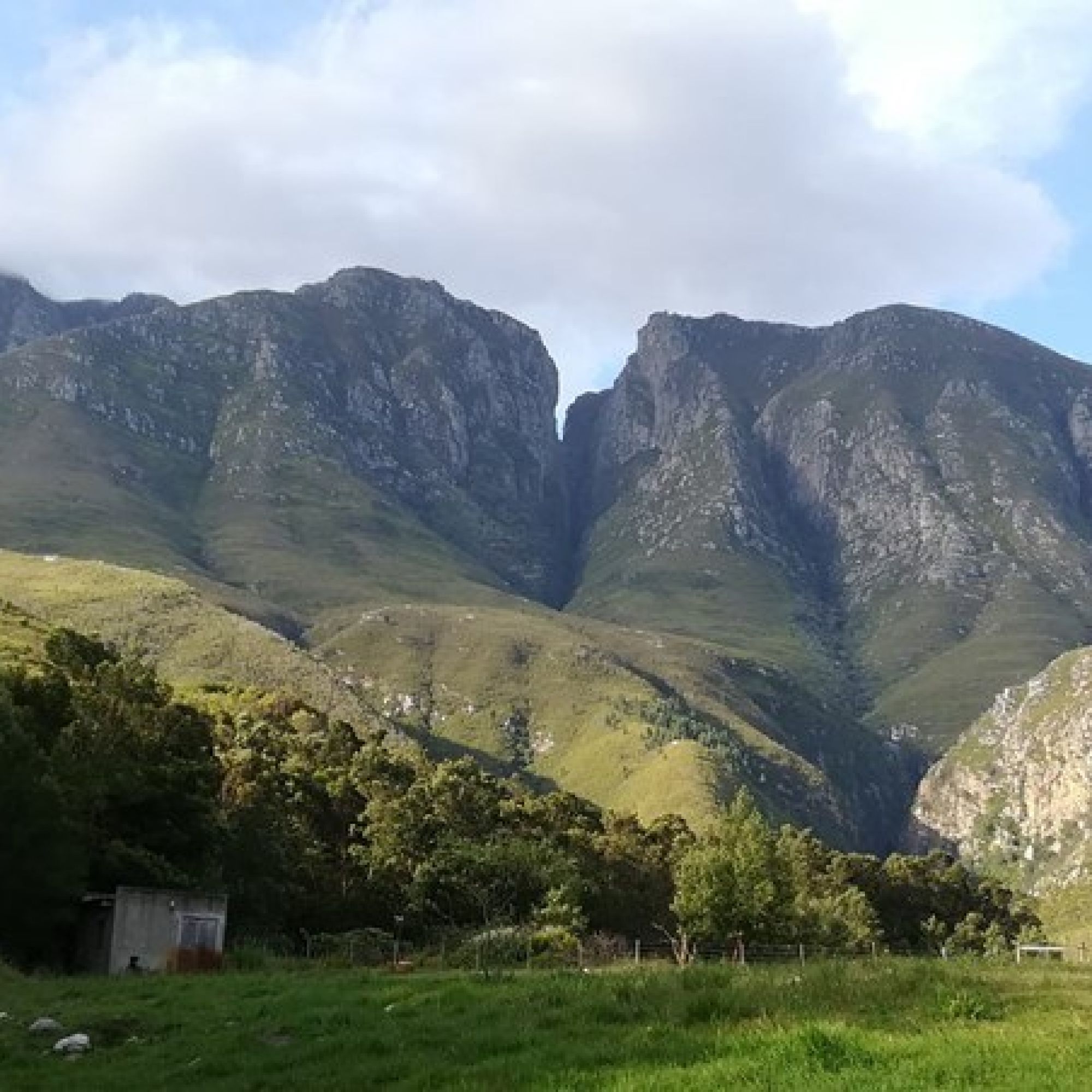
Part of the Langeberg Mountain Catchment, in the area of the Keurbooms River catchment area, at Marloth Nature Reserve outside Swellendam. Notice the invasive alien trees in to foreground as well as the pine trees along the mountain slopes. In the foreground, agricultural land (mostly livestock pastures). Date of photo: 5 December 2018. Taken by Jeanne Gouws
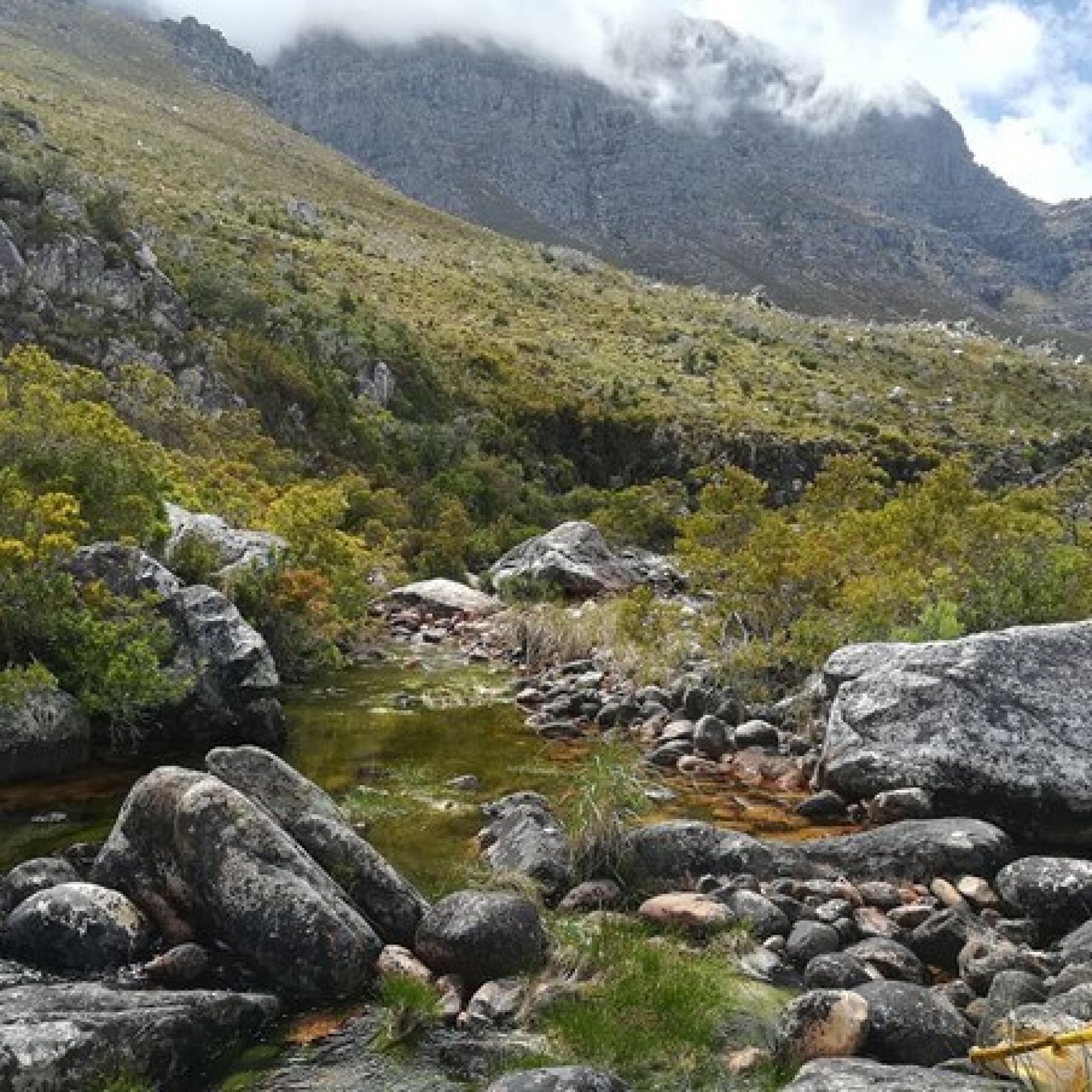
Upstream view on the Witte River, near Bainskloof Village in the Limietberg Nature Reserve (or Hawequa Nature Reserve). It is located within the Boland surface water Strategic Water Source Area. This site is downstream of two weirs, of which the top one is called “Gawie se Water” which is the oldest interbasin transfer scheme in South Africa. This river is heavily impacted by this water abstraction. Date of photo: 18 November 2022. Taken by Jeanne Gouws.
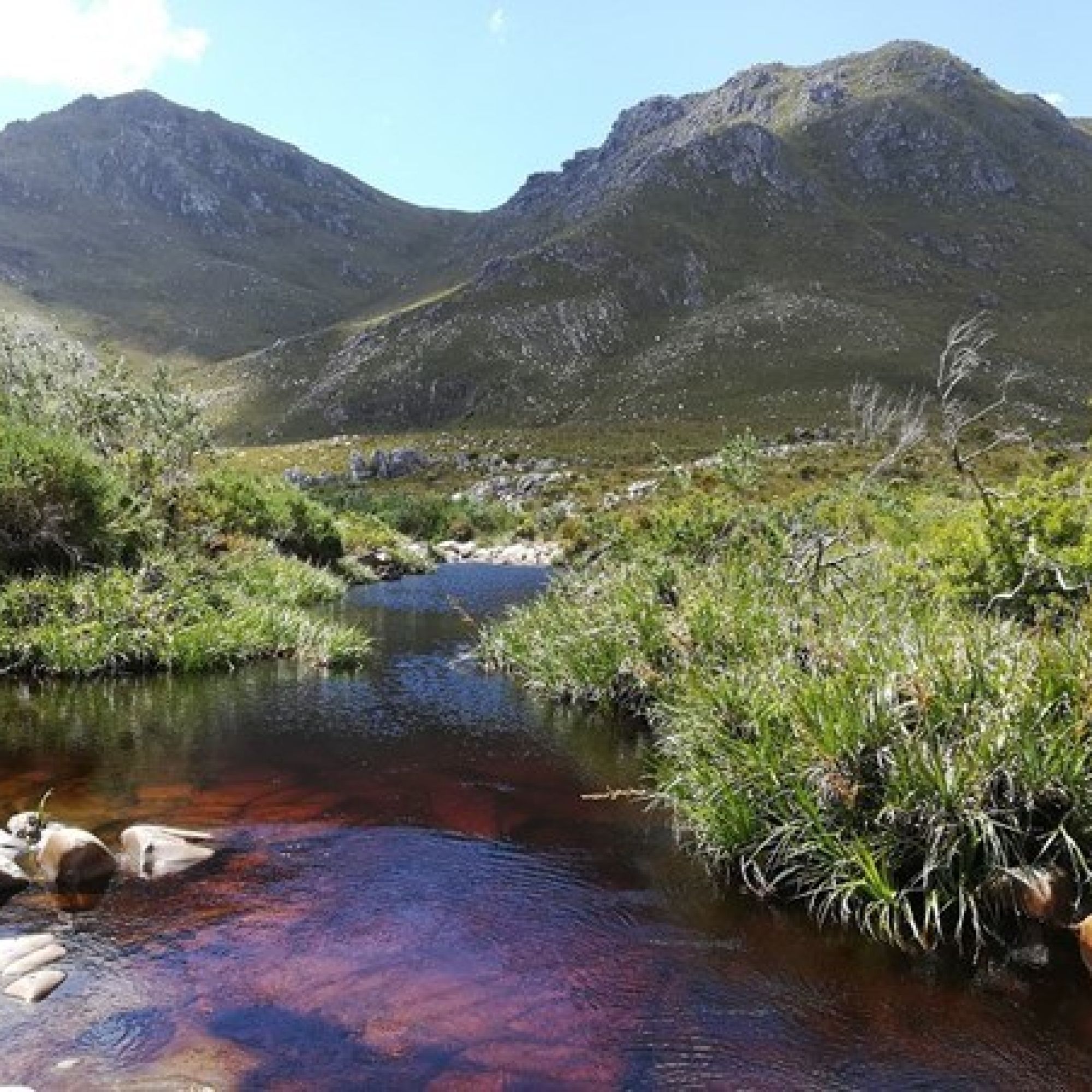
Upstream view on the Palmiet River in the Kogelberg Nature Reserve. This site is located in the lower reaches of the river. The river originates in the Hottentots Holland Mountains and flows through urban and agricultural areas, and it has several instream dams along its reach. Rejuvenation of the ecosystem (hydrology and water quality) takes place when it enters the Kogelberg Nature Reserve, were several natural and good quality water tributaries join the main Palmiet River before it enters the Ocean outside Kleinmond. Date of photo: 10 November 2022. Taken by Jeanne Gouws.
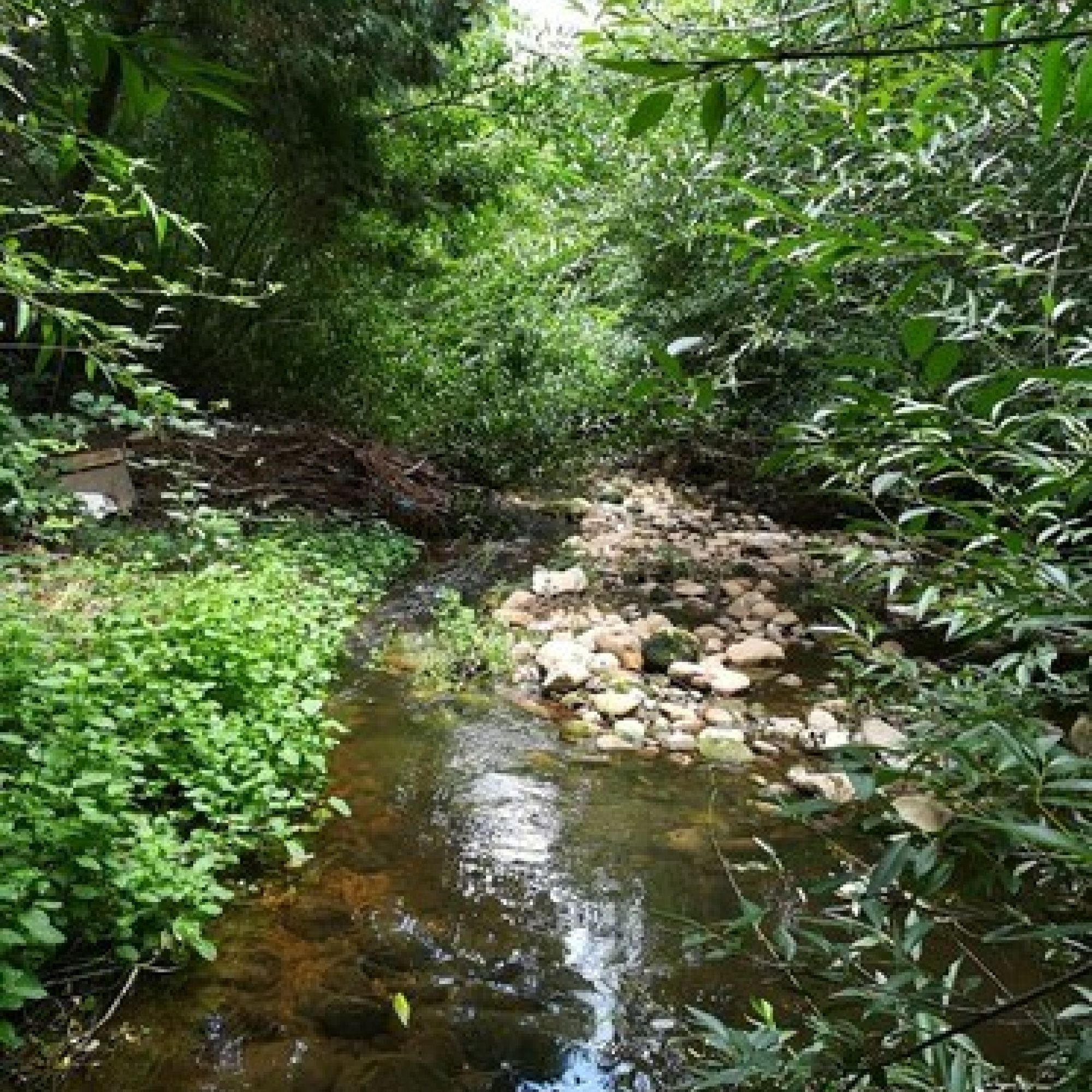
Downstream view at a site on the Elands River at Villiersdorp. This site is located at the inlet channel from the local wastewater treatment works. Here the river receives treated effluent water before it runs down into the Theewaterskloof dam a few kilometers downstream. This river is already impacted higher up in the mountain catchment by farming practices. In the lower areas, it is impacted by storm water and wastewater from Villiersdorp. The riverbanks in the reach is also overgrown with an invasive alien weedy plant.
